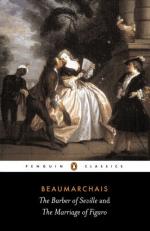|
This section contains 1,683 words (approx. 5 pages at 400 words per page) |

|
Korb has a master's degree in English literature and creative writing and has written for a wide variety of educational publishers. In the following essay, Korb discusses the disparity between social classes as seen in The Barber of Seville.
Despite its comedic situations, clever word play, and inane posturing, The Barber of Seville carried social messages of great importance to its earliest audiences. One of these messages was the irrationality and arbitrariness of the division of social classes. This issue was of rising interest in a society in which the majority of members, the exception being clergy and nobility, held few legal, political, or economic rights. To a self-made man such as Beaumarchais, a system that honored wealth and birth, as opposed to ingenuity, was absurd; thus, Beaumarchais created Figaro, a servant who is smarter and more capable than people with greater wealth and higher social standing...
|
This section contains 1,683 words (approx. 5 pages at 400 words per page) |

|




